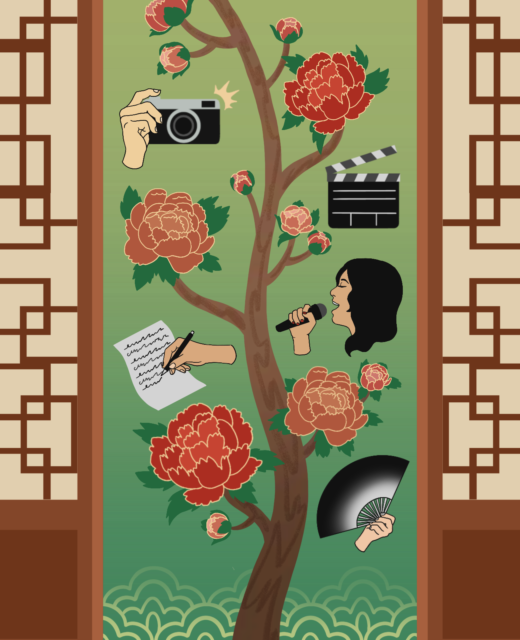UCLA’s 32nd annual Chinese American Culture Night hopes to spotlight the Asian American and Pacific Islander experience until the next lotus blooms.
Hosted by the Association of Chinese Americans, preparing CACN has been a yearlong effort that has led to the debut of the film “Until the Next Lotus Blooms” tomorrow on Zoom and Discord. Premiering during AAPI Heritage Month, the show will also feature the three winners of ACA’s AAPI talent showcase and integrate videos from UCLA’s Chinese lion dance troupe and the Chinese Cultural Dance Club at UCLA. Creative director and fourth-year molecular, cell and developmental biology student Dylan Tan said while the creative process began last May, post-production editing finished just this month.
“The goal is really just to highlight Chinese American culture to the broader UCLA community,” Tan said.
[Related: Artists at Play hosts free virtual plays showcasing Asian American resilience]
Told through two parallel timelines, the cohesive film reflects on both the past and present Chinese American experience. The two stories are unified through repeated motifs and the shared experience across generational divides. Tan said producers wanted to highlight different aspects of the AAPI community’s endurance through racial prejudice.
“As a pre-med student, Zoe wanted to directly address the current COVID-19 situation and Mary An had read about the past events in Hawaii,” Tan said. “So the creative directions helped them write a script that brought both their ideas to life.”
Co-produced by third-year microbiology, immunology and molecular genetics student Zoe Ge and third-year economics student Mary An Nan, the first storyline tells the story of Mei, who was separated from her family during the 1900s bubonic plague outbreak in Hawaii’s Chinatown. Forced into the government-sanctioned quarantine camps for Asian Americans, the character must confront her identity as an immigrant in America.
Moving through the generations, the second story follows Jocelyn, an expecting mother struggling with her marriage during the COVID-19 pandemic, said second-year molecular, cell and developmental biology student Edmund Zhi, who plays Mei’s older brother figure Frank. Brought up her entire life on traditional familial values, Zhi said Jocelyn has to choose between following tradition or her own happiness.
Previously unaware of the past injustices faced by the AAPI community during the bubonic plague, Zhi said it’s crucial that the film highlights these underrepresented narratives to inform the general community. Without these past narratives actively being brought to the forefront, they often get swept aside or forgotten.
“We’re calling to light the issues that are actually repeated in Asian American history,” Zhi said. “There’s hope in the sense that we’re bringing attention to these things and people are sparking that call for change.”
For the past 30 years, CACN has traditionally been held in Royce Hall. Tan said adapting to a virtual format this year has born its own set of challenges for the cast and board members with fundraising, finding sponsors and selling merchandise online. The cast also had to deal with the limitations of online rehearsals like the struggle to create genuine emotional connections with the other actors, Zhi said.
“It’s hard to get the timing correct over Zoom, especially during the more intense scenes,” Zhi said. “For example, argument scenes where you have to go back and forth and cut each other off – it’s kind of awkward with the delay.”
[Related: Video game creates space to discuss mental health, Asian American experience]
Because of these restrictions, Zhi said the two in-person rehearsals the cast held before filming were extremely necessary. Still navigating safety precautions, each cast member had to submit two negative COVID-19 tests prior to meeting in person, he said. Once everyone was cleared, the entire production was filmed within a 10-hour shoot in a studio near Koreatown.
While the online format has presented these novel challenges, CACN’s marketing chair, Irene Chang, said the virtual production can reach more people who otherwise would not have been able to see the event in person. The first-year psychobiology student said incorporating video submissions from UCLA’s AAPI community increased its accessibility, allowing for more diversity and representation in the show.
“We wanted more people to be a part of CACN this year and allow the audience to also have something showcased during our event,” Chang said.
In light of the recent attacks on the AAPI community, the importance of celebrating Chinese American culture is felt more strongly than ever, Zhi said. Although told through a contemporary lens, Zhi said “Until the Next Lotus Blooms” calls attention to the community’s past unwavering perseverance through adversity.
“AAPI hate is not a new thing that’s been going on,” Zhi said. “It’s important to shed light on these lesser-known aspects of history and put things into a new perspective.”

